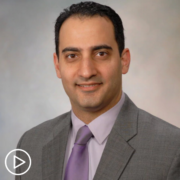Myeloma Treatment Options: Where Do Clinical Trials Fit In?
Myeloma Treatment Options: Where Do Clinical Trials Fit In? from Patient Empowerment Network on Vimeo.
Dr. Peter Forsberg discusses how clinical trials help improve care for myeloma patients and shares advice to patients who are fearful about joining a trial.
Dr. Peter Forsberg is assistant professor of medicine at the University of Colorado School of Medicine and is a specialist in multiple myeloma. More about Dr. Forsberg here.
Download Program Resource Guide
See More From The Pro-Active Myeloma Patient Toolkit
Related Resources:

|

|

How Can Myeloma Patients Advocate for the Best Care?
|
How Can Myeloma Patients Advocate for the Best Care?
Transcript:
Katherine:
Where do clinical trials fit in as a treatment choice?
Dr. Forsberg:
So, I do clinical trials in myeloma, I am certainly an advocate for the important role of clinical trials in myeloma. It is how we learn more about how best to treat patients. So, clinical trials are the foundation on which our decision-making has been built and continues to be refined. We are at a place where clinical trials don’t mean one thing. There are different types of clinical trials. Different stages of trials. Some that may be what we call, early phase that’re looking at brand new medicines or medicines in entirely different ways.
And ones that are late phase, where they may be comparing a well validated standard of care, versus a new approach. So, understanding what the potential clinical trial is and what that entails and what its goals are, are an important factor for patients as they consider participating. But beyond that, trials are a really critical area for us to evaluate new therapies and to get better at using the medicines we have in novel or improved ways.
So, they can be a really useful piece for not only the myeloma community, but for patients as they navigate through. So, I haven’t had many patients who I take care of who participated in clinical trials and been disappointed that they did so. Usually, it’s a positive experience.
Even if it is one where you want to understand what you may be embarking upon as you begin the process.
Katherine:
Some patients can be fearful when it comes to clinical trials. What would you say to someone who might be hesitant to consider participating in one?
Dr. Forsberg:
Well, like I said, I would say that one of the most important things is making sure you understand what the goal of the trial is. What it entails. Clinical trials may have one name, but they’re very different things. And the right type of trial may be very different in different clinical circumstances. So, feeling comfortable with what it is. Making sure you feel comfortable asking your provider what the rationale for the trial is.
But also, as I mentioned, trials are a unique process and one that can often be very fulfilling for patients. Understanding that not only may you be trying a new treatment approach, but that you’re hoping to contribute to our improvement for how we manage multiple myeloma. It’s an altruistic goal. But it can be one that can be pretty meaningful for patients if they’re comfortable moving in that direction.










